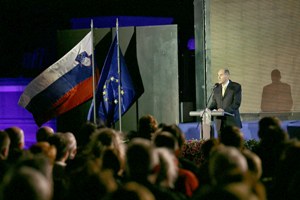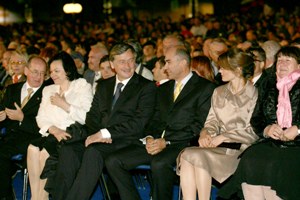“The history of the Primorska region, infused with bitter experiences of fascism and later with joy when returning to its homeland, remains a permanent foundation of the Slovene nation. Despite the present political conditions and possible separations, we must know how to draw upon what connects us as a nation. If we learn to do so, we will face good times ahead, times of cooperation, which can be achieved by having united development powers. It is possible to build a bridge even to the farthest bank, and it is possible to find the right direction even on the most winding of paths. You, the people of the Primorska region, have managed this throughout your history. I am convinced that the unity of spirit of the Primorska region will pervade the Slovene nation even more intensely. When this happens, we shall manage to better appreciate our history, because it is our common history, and we shall love our country even more,” stated the Prime Minister in his formal address in Koper, on the occasion of the national celebration of the return of the Primorska region to its homeland.

(Foto: Bor Slana/Bobo)
The Prime Minister emphasised that in spite of being separated from their homeland, the people of Primorska maintained their national awareness and their sense of belonging to the Slovene nation. Initially they responded to the fascist violence inflicted upon them with cultural contempt and then later with armed resistance. “The secret organisation TIGR, which had even been described by some people as a terrorist organisation only a few years ago, actually operated in the spirit of the Slovenian tradition of resistance. It was the first anti-fascist organisation in Slovenia and the first armed resistance against fascism in Europe. It fought solely for the survival of the Slovene people, Slovenian culture and democracy and the freedom of the people of the Primorska region,” said the prime minister. In this regard he added that the united and long-lasting resistance of Primorska to national oppression, the resistance of the TIGR and partisans of the Primorska region, as well as the military victory within the context of the Allied Forces, created very favourable conditions for the restoration of the entire Slovenian national territory to its homeland. However, following World War II, a considerable portion of the Slovenian region of Primorska, including Trieste and Gorizia and over 100,000 Slovenes, remained part of the territory of the neighbouring country. “At the time international factors tailored our fate according to their and the then-Yugoslav dimensions. The Croatian territory annexed to Italy on the basis of the Rapallo Treaty was returned to Croatia. Neither an inch of their land nor a drop of their sea on their western border was lost. This is a historical fact of utmost importance. At that time Slovenia alone paid the price of the break-up. Slovenia will therefore persist in its argument that the unresolved issues regarding the sea border between Slovenia and Croatia should take into consideration both the state existing on 25 June 1991 and the principle of equity. We have been deprived too often in our history to give in on this point,” said the Prime Minister.
Prime Minister Janša noted that respect for the national awareness of Slovenes in the Primorska region, as well as other Slovenes – from Venetian Slovenia to Rezija and the valley of Kanal, must remain an obligation, in addition to more concrete and intensive cooperation between the homeland and our fellow countrymen who preserve Slovene national awareness abroad. Within this context he mentioned that the elimination of EU borders has, after centuries, united the common Slovenian cultural space. We are still unaware of all the new opportunities created by the elimination of borders created within this common Slovenian cultural space. It is time for us to write a new chapter with special care,” stressed the Prime Minister, who also recalled the establishment of the Euro-Mediterranean University as one of the most important projects of Slovenia’s Presidency, as it places Slovenia at the academic intersection of all 39 countries of the Euro-Mediterranean partnership and has the potential to become an important messenger of intercultural dialogue.

(Photo: Bor Slana/Bobo)
In his address, the Prime Minister also touched upon the economic and developmental potential of the Primorska region and stated that in the past the Primorska region contributed numerous innovators and successful businessmen. New economic centres are being established in the Primorska region to meet the needs of creating innovative and technologically-oriented companies, in order to attract creative and dynamic individuals. These centres shall be the bearers of the future economic development of the region. “Luka Koper, with its further development, shall strengthen its competitiveness through the new highway and future railway connections. We shall also bring to the forefront efforts for the ecological protection of the Northern Adriatic and the Slovenian coast. The tourist offerings of the Primorska region will further improve its quality and increase its added value.” In the words of the Prime Minister, the Primorska region is now already one of the most successful regions in Slovenia, based on its level of development and its low unemployment rate. In this vein he stressed that, according to all criteria, Slovenia can reach the European average in regard to the level of real wages and pensions by 2015. The Prime Minister explained that 10 years ago the purchasing power per inhabitant reached 78% of the European average, while that of neighbouring Italy reached 120%, a difference of 42 percentage points. A decade later this difference has been reduced to a mere 9 percentage points.
In his formal address, Prime Minister Janez Janša also expressed his thanks to the writer Boris Pahor and to all other individuals and important thinkers whose thoughts acted as guiding lights on the difficult path walked by Slovenia in the 20th century.